- Home
- Graham McNeill
Gods of Mars Page 5
Gods of Mars Read online
Page 5
‘Clarification required,’ said the servitor. ‘What is it you wish removed?’
‘The Icon Mechanicus,’ said Emil. ‘Get it off.’
‘Unable to comply,’ said the servitor. ‘Express permission from a tech-priest, rank Lambda-Tertius or higher, is required before this servile may deface/remove an Icon Mechanicus.’
‘Throne, don’t you bloody Mechanicus know anything about why starships stay aloft?’ he snapped. ‘Here, hand me that pneuma-hammer.’
The servitor held the device out and Emil snatched it from its unresisting grip. He bent to the airlock hatch and with three swift blows from the pneuma-hammer battered the silver-steel icon to the deck.
‘Good as new,’ he said, holding the pneuma-hammer out behind him and brushing flecks of metal shavings away with his free hand. The hammer was plucked from his grasp and a gruff voice came from behind him.
‘And this is why you leave engineering to folk who know what they’re doing.’
‘It’s bad luck to cover up the original maker’s marks,’ said Emil, standing upright.
Kayrn Sylkwood, Renard’s enginseer, saw the emblem he’d knocked off the ship and nodded in agreement. She ran a hand over the dented metalwork Emil had just beaten free of the Icon Mechanicus.
‘Nice work,’ she said. ‘Subtle.’
‘You’re an enginseer, what do you know about subtle?’
‘More than you, by the looks of it,’ said Sylkwood. The rivalry between a pilot and a ship’s master of engines was long-established. One trying to squeeze the most out of a ship’s reactors, one trying to keep the other from blowing them up.
Clad in a tight-fitting vest and combat jacket, Kayrn Sylkwood was a born and bred enginseer. Knotted communion implants lined her shaven skull in metallic cornrows, and her tanned features had a laconic superiority to them. Baggy fatigues that might once have been tan-coloured, but which were now an oil-sodden slate, were tucked into military boots, laced in the Cadian cross-hatch style.
‘How’s it looking out here?’ she asked.
‘Despite the odd bit of complete idiocy, not as bad as I expected,’ said Emil, moving down the hull towards the sunken space below the prow, where sparks from arc-welders and lascutters fell like neon-blue rain. Sylkwood fell in alongside him, unconsciously matching his step. The two servitors resumed their obedient following.
‘Speranza’s priests actually seem like they know what they’re doing,’ said Emil, running his hands along the warm metal of the Renard’s fuselage. ‘The damaged hull plates have been repaired in Turentek’s prow-forges, the forward auspex arrays have been stripped out and replaced, and I see the transverse inertial arrays being reinforced. There’s been some unasked-for upgrades by the look of it, but I’ll only find out exactly what when I take her out again.’
‘Not bad,’ said Sylkwood. ‘Not bad at all.’
‘They all done in the engine spaces?’
Kayrn nodded. ‘Yeah, there wasn’t much to do, and Ilanna had left pretty specific instructions. But I didn’t let them do anything without me right there with them. If we had a halfway decent pilot at the helm, I’d guess we’d probably see a ten per cent boost to Renard’s top speed and reactor efficiency.’
‘Then I’ll get fifteen.’
‘You think?’
‘Bet you a shift on the loaders.’
They spat on their palms and slapped hands.
‘You watch, I’ll get my ship doing things her builders never even dreamed of,’ said Emil.
‘Your ship?’ said Kayrn with a grin. ‘I reckon the captain might have something to say about that word choice.’
Emil returned her grin. ‘Roboute isn’t here. And he doesn’t fly the ship, I do. In my books that makes the Renard mine.’
Kayrn looked set to challenge that assertion, but before she could do more than cock an eyebrow, they heard a horrified wail from the entrance to the graving dock.
‘What the hell?’ said Kayrn, her hand falling to the butt of her holstered laspistol. ‘Is that Vitali Tychon?’
‘Looks like,’ said Emil, lifting his hand to shield his eyes from the glare of the deck’s harsh lighting. ‘I think he’s been hurt.’
Vitali staggered towards the Renard. His robes were drenched in blood from the chest down. Did Mechanicus priests have that much blood in them?
‘It’s not his blood,’ said Kayrn as Vitali half ran, half staggered towards them. He was shouting something, but his words were too grief-stricken and anguished to make out.
‘Then whose blood is it?’ said Emil.
Forge Elektrus was not what Abrehem had imagined when Totha Mu-32 had said he was to be apprenticed to a magos of the Cult Mechanicus. He had pictured towering engines and the thunderous, unceasing labours of powerful machinery.
A place where things were made, technology unbound.
Not this place of antiquity, an echoing machine-temple where dust lay thick on the titanic engines that stood cold and dead to either side of a mosaic-covered nave. The only machines at work here were the lumen staves carried by the two forge overseers and the crackling inload trunking that allowed the thirty shaven-headed tech-priests to link their cognitive capacity.
Arranged in five rows of six, they sat on hard wooden benches before a rusted throne worked into a representation of the Icon Mechanicus. Chained together like galley slaves by ribbed copper cabling plugged into data-sockets in the backs of their skulls, their heads bobbed rhythmically to a hypnotic binary beat only they could hear.
Abrehem had seen that every one was the lowest rank it was possible to be and still be counted as one of the Martian priesthood. Many bore terrible injuries suffered in service to the Machine-God: missing limbs, burned skin and cratered skulls. Just as many bore marks of censure in their noospheric auras. Others had been implanted with augments that had obviously been damaged or been cycled through so many adepts over the centuries that it was a miracle they functioned at all.
Truly this was a forge of the damned, where the lowliest, most pitiable adepts imaginable toiled. So why had Totha Mu-32 sent him here? What could he possibly learn in a place populated by the mad, the infirm and the punished?
How was this any better than where he had come from?
No answer was obvious, and Chiron Manubia had thus far been less than forthcoming. Without the necessary inload sockets, Abrehem couldn’t take his place with the linked adepts in their fugue state, and for that he was profoundly grateful.
Instead, he sat on the pew of a wide timber lectern, such as he might expect to find in a mass scriptorium of the Administratum. A book of quantum runes lay open before him, each holy circuit etched into the electro-conductive pages with copper wiring.
The book was ancient and marked by thousands of blurred fingerprints. Perhaps it had belonged to the first builders of this temple.
He’d been studying it for what seemed like weeks, tracing metalled fingers across its dogmatic forms and endless repetition. Its needless complexity was straining his powers of concentration and testing the limits of his boredom. Almost every litany was monstrously overwrought and only achieved what he could do with a thought. To work to such prescribed methods was ridiculous and he sat back from the book with a weary sigh of resignation.
‘You think you’re too good for Forge Elektrus, don’t you?’ said his new tutor, startling Abrehem from his gloomy contemplation of a needlessly complex runic form of the Ohmic Evocation.
Abrehem looked up into the almond-shaped face of Chiron Manubia.
He still didn’t know what shared history lay between her and Totha Mu-32, but every time he looked at Manubia’s face, he felt sure it had involved something unpleasantly biological.
‘No, that’s not it at all,’ said Abrehem.
‘You’re a terrible liar,’ said Manubia, sitting next to him on the lectern’s pew.
‘Sorry, I just thought your forge would be… different.’
Manubia cocked an eyebrow.
&nb
sp; ‘Different,’ she said, echoing the wariness he’d put into each syllable. ‘You thought it would be a forge where the wonders of technology were handed down straight from the golden hands of the Omnissiah?’
Abrehem kept his mouth shut in case he said something truly stupid. He tapped the iron fingers of his augmetic arm against the edge of the lectern.
Manubia smiled. ‘I thought so. Forge Elektrus isn’t quite like the forges depicted in the devotional frescoes, is it?’
Since lying to Manubia clearly wasn’t an option, Abrehem opted for honesty. ‘No, it hardly looks like a forge at all.’
‘What did you think? That someone who almost got the Speranza destroyed was going to just walk into the most prestigious forge on the ship and begin his rise through the Cult Mechanicus?’
‘No, of course not, but…’
‘But you thought you’d be learning all our secrets from the minute you walked in,’ said Manubia. ‘Well, I’m afraid you have to earn that right, Abrehem Locke. Because, right now, you are the lowest of the low. You are the scrapings of millennial rust from a broken gear, the contaminated oil that’s on the verge of being too polluted to use on even the most mangled waste recycler. And the only reason I didn’t slam the door in Totha Mu-32’s face is that, Omnissiah preserve me, I think he might be right about you.’
‘That I’m Machine-touched?’
‘No, that you’re dangerous,’ said Manubia.
‘Dangerous?’
‘You think you know machines, that you can talk to them and that it’s a simple matter to coax them into doing what you want, but you’re like a child with the key to an armoury of loaded weapons,’ said Manubia, jabbing a finger at the book of quantum runes. ‘You have power, a power I don’t understand yet, but you don’t know how to use it safely. That’s why you’re here – not to become the saviour of the Adeptus Mechanicus, but to be controlled, to have whatever power you have made safe. That’s what I do, Abrehem Locke.’
‘What you do?’ said Abrehem, angry at being so casually dismissed. ‘It doesn’t look like you do anything here.’
Manubia turned and gestured to the cog-toothed entrance to her forge.
‘Then feel free to leave, but know that no priest of the Cult Mechanicus will ever let you inside their temple again.’
Abrehem slammed the open palm of his artificial arm on the book of quantum runes.
‘Then tell me, Adept Manubia,’ he said. ‘What do you do? What vital role in the operations of the Speranza are these poor wretches involved in?’
‘Nothing,’ said Manubia. ‘They’re too broken to be of any use.’
Abrehem shook his head. ‘Then I don’t see any point in me being here.’
‘You didn’t let me finish,’ said Manubia. ‘They’re here because they’re broken. But by the time they leave, they won’t be. I gather up the waifs and strays of the Cult Mechanicus – the damaged, the broken, the data-blind, the augment-crippled – and I give them purpose again. I rebuild and remake what’s broken inside them and I make them useful again. I give them purpose. And that’s what I can do for you, if you’ll let me.’
‘I’m not broken,’ said Abrehem.
‘Aren’t you?’ said Manubia, her face lit from below by a swiftly glowing illumination.
Abrehem looked down, his eyes widening as he saw the etched copper diagram of the Ohmic Evocation fill with liquid light that flowed from his iron fingers. The metalled surface of the book felt hot to the touch, the light penetrating deeper into its pages with each passing second.
‘Whatever you’re doing, stop it now,’ demanded Manubia. ‘Lift your augmetic from the book.’
Abrehem shook his head. ‘I can’t,’ he said.
Golden light poured from the book, following the corded cables plugged into the base of the lectern. It lit the forge in a radiance it had not known since its earliest days, passing through the archaic trunking system and into the crippled tech-priests.
They stiffened as the light flowed into them and through them, seeking new pathways to illuminate, new circuits to restore. Thousands of snaking threads of golden light moved through the machine-temple, racing along frayed and forgotten wires. The Icon Mechanicus shimmered with reflected radiance as ancient wiring within the throne that had not known the touch of electro-motive power in millennia pulsed with life.
‘How are you doing this?’ gasped Manubia. ‘What are you doing?’
Abrehem had no answer for her, watching as first one, then another of the dormant machines around the perimeter of Chiron Manubia’s forge flickered with its own internal light.
Ancient cogs turned with grating squeals, rusted gears cranked into painful motion and long-stilled machine hearts began beating once more.
One by one, the titanic engines returned to life.
The approach to the bridge of the Speranza was a towering processional vault known as the Path to Wisdom, precisely one thousand metres long, with sixty equidistant archways to either side. Threaded columns wound with variant binary forms supported the latticework tangle of green iron girders and a cloud layer of lubricant incense clung to the corbels, where squatted fat mechanical cherubs. Long strips of votive binary chattered from their mouths, random praise to the Omnissiah that teams of tech-priests and lexmechanics studied intently for any divine messages.
Sheet metal banners hung within the arches, each venerating a different branch of Mechanicus theology, from shield technology to teleportation, from weapon design to engine maintenance. A great Icon Mechanicus stared down in judgement at those who approached.
None of the tech-priests surrounded by strips of ticker-tape around the base of each column paid any attention to the small, determined group making its way to the monolithic adamantium gates of the bridge.
Vitali Tychon led the way, with Kayrn Sylkwood, Emil Nader and Adara Siavash struggling to keep up with the venerable adept. The crew of the Renard were armed, which Emil wasn’t so sure was a good idea. But as soon as Vitali had managed to explain why he was covered in blood, Emil knew a confrontation was inevitable.
And if life on Ultramar had taught Emil anything, it was that it was always a good idea to be prepared for the worst.
The vast door to the bridge was protected by a demi-cohort of praetorians, clanking mechanised killers on tracks, articulated stalk legs or heavy Dreadnought chassis. Their armaments were a lethal array of plasma weaponry, rotor carbines and linked lascannons. Smaller than the praetorians were the weaponised servitors, grotesquely augmented humans with steroidal musculatures, sub-dermal armour plating and vicious arrays of implanted blades, drills and power fists.
Emil shared a glance with Kayrn Sylkwood. Neither was a stranger to mass warfare, but these cyborgs were something else entirely – metal-masked and dispassionate.
Their approach had been noted, and every one of the Mechanicus battle-servitors turned its targeting auspex upon them. Emil had never felt quite so vulnerable.
‘No sudden movements,’ said Vitali, his voice cold, where normally it was infectiously vibrant. ‘Let me take care of this.’
‘Don’t you worry about that,’ said Emil, keeping his hands well away from his hand cannon. The weapon had been his father’s, presented to him upon earning his captaincy in the Espandor Defence Auxilia. Emil had inherited it upon his father’s death a month later. Talassarian mother-of-pearl was embedded in the walnut grip in the shape of an ultima.
‘Do you actually know how to use that thing?’ asked Sylkwood.
He nodded. ‘I know every inch of this gun,’ said Emil. He’d maintained it with all the due diligence drummed into him since childhood. ‘It’s in as perfect working order as it was the day it left the craftsman’s workbench.’
‘You ever fired it?’
‘No, not once.’
‘Good to know,’ said Sylkwood.
‘Look, it’s not me you need to worry about,’ said Emil, nodding towards Adara Siavash. The youthfully handsome gunman had come aboard the R
enard a number of years ago as a passenger, but after proving he had what it took to use his pistols and ubiquitous butterfly blade, Roboute had decided to keep him on as a member of the crew. For a man so intimate with ways of ending life, he wore his heart on his sleeve, and had been endearingly sweet in his hopeless infatuation with Mistress Linya.
Emil had seen Adara fight and kill, but until now, he’d never seen him angry. The cold, unflinching, razor-fine hostility he saw in the youth’s eyes was not something he’d ever expected to see.
‘Listening, Adara?’ said Sylkwood. ‘Let Vitali take the lead.’
The young gunman nodded, but didn’t reply.
Sylkwood shrugged with an I tried expression.
Vitali didn’t slow his pace as he approached the praetorians and weaponised servitors. Auspexes clicked and whirred as lenses extended, gathering information from Vitali’s noospheric aura. Satisfied it was addressing a being that didn’t qualify for immediate destruction, a towering praetorian armed with twin power fists extended a vox-unit from its throat.
‘Magos Vitali Tychon, stellar cartographer, AM4543/1001011.’
‘Stand down,’ said Vitali.
An internal cogitator whirred within its cranium and a chattering stream of tape emerged from the back of its skull.
‘Your presence has not been requested.’
‘I’m aware of that, but I’m going onto the bridge and you are not going to stop me.’
‘Without current authorised access privileges, entry to the bridge is impossible,’ said the praetorian.
‘I am a high magos of the Adeptus Mechanicus,’ snapped Vitali. ‘Are you going to stop me?’
‘Updated bridge security protocols authorise the use of force up to and including, but not limited to, lethal levels.’
Emil felt a layer of sweat form all over his body. The cyborg was talking about killing them with as much thought as he might give to stepping on a ship louse.
He leaned over to whisper to Kayrn. ‘If I’m going to die here, I’d rather it was at the hands of something that gave a damn about killing me.’

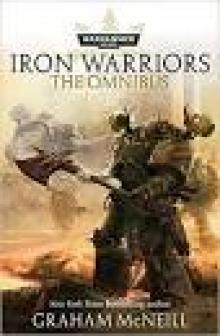 Iron Warriors - The Omnibus
Iron Warriors - The Omnibus Old Wounds, New Scars
Old Wounds, New Scars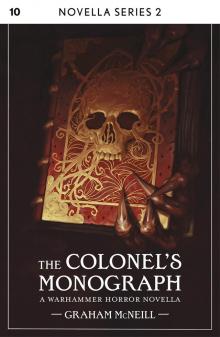 The Colonel's Monograph
The Colonel's Monograph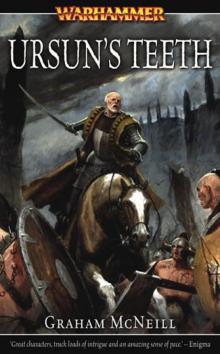 Ursuns Teeth
Ursuns Teeth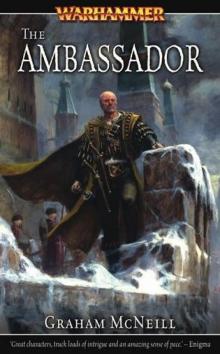 The Ambassador
The Ambassador![[Ultramarines 5] Courage and Honour - Graham McNeill Read online](http://i1.bookreadfree.com/i/03/12/[ultramarines_5]_courage_and_honour_-_graham_mcneill_preview.jpg) [Ultramarines 5] Courage and Honour - Graham McNeill
[Ultramarines 5] Courage and Honour - Graham McNeill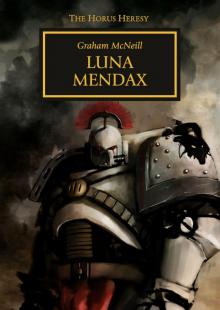 28a Luna Mendax
28a Luna Mendax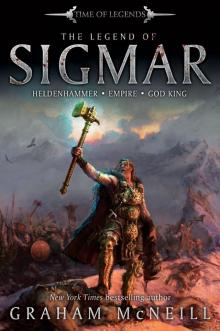 The Legend of Sigmar
The Legend of Sigmar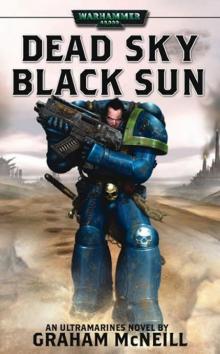 Warhammer - Ultramarines 03 - Dead Sky, Black Sun (McNeill, Graham)
Warhammer - Ultramarines 03 - Dead Sky, Black Sun (McNeill, Graham)![Warhammer - [The Ambassador Chronicles 01] - The Ambassador Read online](http://i1.bookreadfree.com/i/03/17/warhammer_-_[the_ambassador_chronicles_01]_-_the_ambassador_preview.jpg) Warhammer - [The Ambassador Chronicles 01] - The Ambassador
Warhammer - [The Ambassador Chronicles 01] - The Ambassador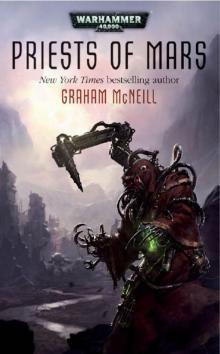 Priests of Mars
Priests of Mars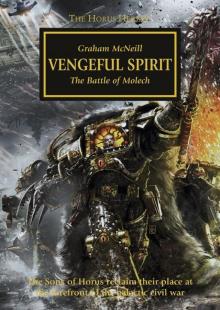 Vengeful Spirit
Vengeful Spirit![[Sigmar 03] - God King Read online](http://i1.bookreadfree.com/i/03/13/[sigmar_03]_-_god_king_preview.jpg) [Sigmar 03] - God King
[Sigmar 03] - God King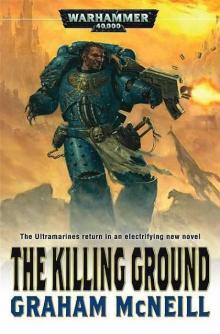 The Killing Ground
The Killing Ground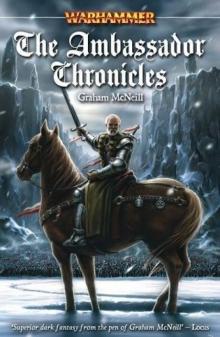 The Ambassador Chronicles
The Ambassador Chronicles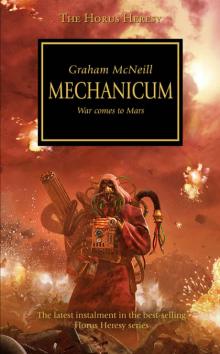 Mechanicum
Mechanicum![[Ulthuan 02] - Sons of Ellyrion Read online](http://i1.bookreadfree.com/i/03/14/[ulthuan_02]_-_sons_of_ellyrion_preview.jpg) [Ulthuan 02] - Sons of Ellyrion
[Ulthuan 02] - Sons of Ellyrion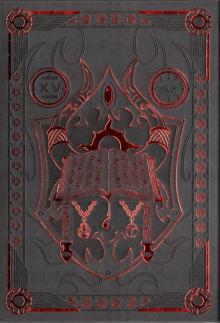 Magnus the Red: Master of Prospero
Magnus the Red: Master of Prospero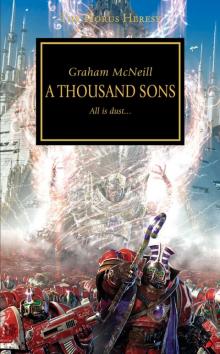 A Thousand Sons
A Thousand Sons![[Warhammer] - Guardians of the Forest Read online](http://i1.bookreadfree.com/i/03/18/[warhammer]_-_guardians_of_the_forest_preview.jpg) [Warhammer] - Guardians of the Forest
[Warhammer] - Guardians of the Forest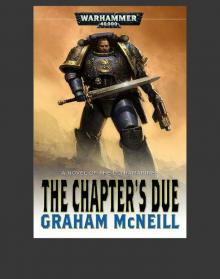 The Chapters Due
The Chapters Due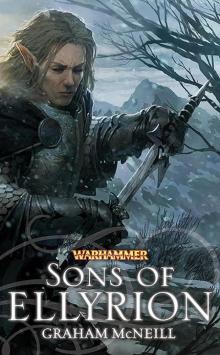 02 - Sons of Ellyrion
02 - Sons of Ellyrion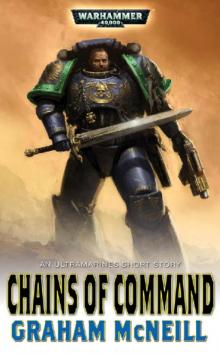 Chains Of Command
Chains Of Command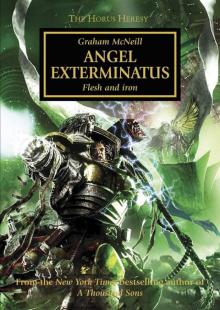 Angel Exterminatus
Angel Exterminatus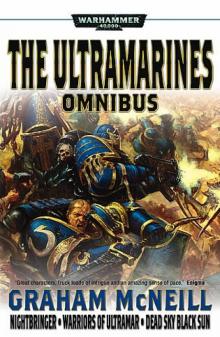 The Ultramarines Omnibus
The Ultramarines Omnibus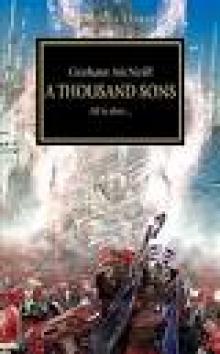 X Marks da Spot
X Marks da Spot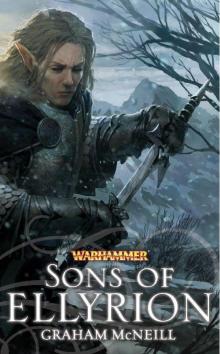 Sons of Ellyrion
Sons of Ellyrion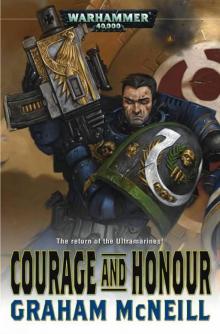 Courage And Honour
Courage And Honour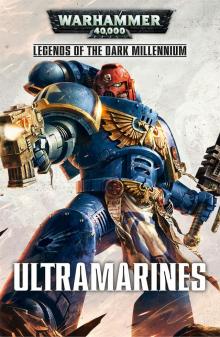 Ultramarines
Ultramarines![[Ulthuan 01] - Defenders of Ulthuan Read online](http://i1.bookreadfree.com/i/03/16/[ulthuan_01]_-_defenders_of_ulthuan_preview.jpg) [Ulthuan 01] - Defenders of Ulthuan
[Ulthuan 01] - Defenders of Ulthuan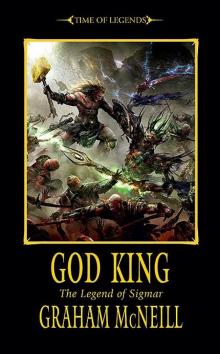 03 - God King
03 - God King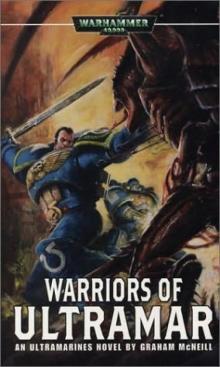 Warhammer - Ultramarines 02 - Warriors Of Ultramar (McNeill, Graham)
Warhammer - Ultramarines 02 - Warriors Of Ultramar (McNeill, Graham)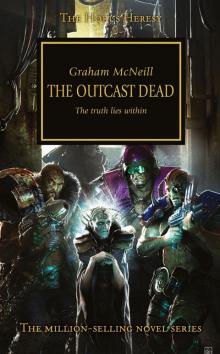 The Outcast Dead
The Outcast Dead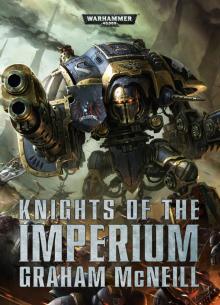 Knights of the Imperium
Knights of the Imperium Defenders of Ulthuan
Defenders of Ulthuan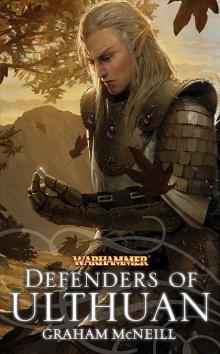 01 - Defenders of Ulthuan
01 - Defenders of Ulthuan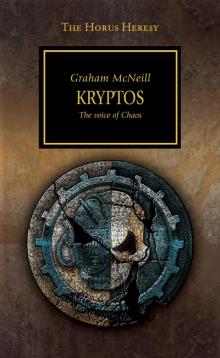 Kryptos
Kryptos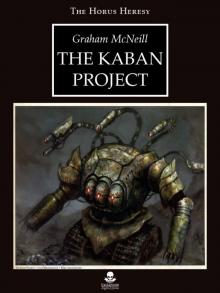 The Kaban Project
The Kaban Project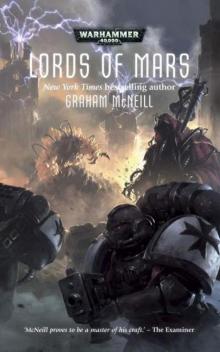 Lords of Mars
Lords of Mars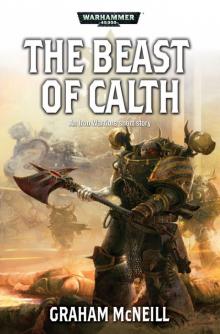 The Beast of Calth
The Beast of Calth Ghouls of the Miskatonic (The Dark Waters Trilogy)
Ghouls of the Miskatonic (The Dark Waters Trilogy)![[Sigmar 01] - Heldenhammer Read online](http://i1.bookreadfree.com/i/03/24/[sigmar_01]_-_heldenhammer_preview.jpg) [Sigmar 01] - Heldenhammer
[Sigmar 01] - Heldenhammer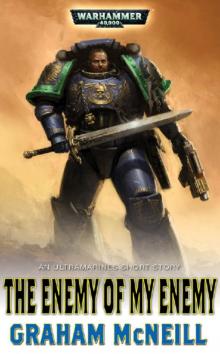 The Enemy Of My Enemy
The Enemy Of My Enemy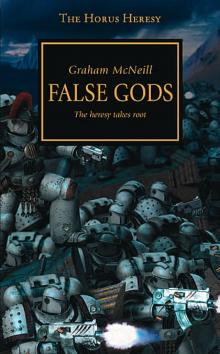 False Gods
False Gods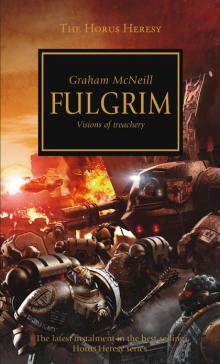 Fulgrim
Fulgrim Mechanicum whh-9
Mechanicum whh-9 Death of a Silversmith
Death of a Silversmith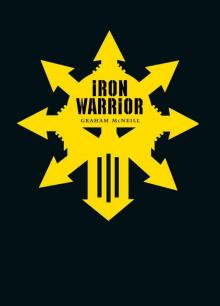 Iron Warrior
Iron Warrior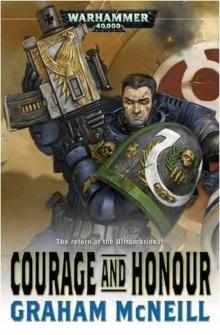 Courage and Honour w4u-5
Courage and Honour w4u-5![[Ultramarines 6] Chapters Due - Graham McNeill Read online](http://i1.bookreadfree.com/i1/03/30/[ultramarines_6]_chapters_due_-_graham_mcneill_preview.jpg) [Ultramarines 6] Chapters Due - Graham McNeill
[Ultramarines 6] Chapters Due - Graham McNeill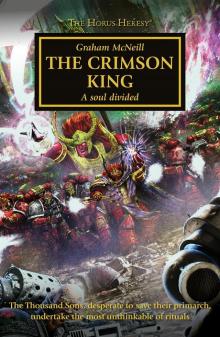 The Crimson King
The Crimson King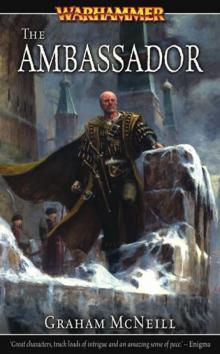 1 the ambassador
1 the ambassador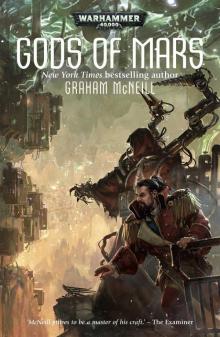 Gods of Mars
Gods of Mars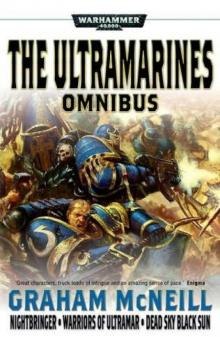 Ultramarines Omnibus (warhammer 40000: ultramarines)
Ultramarines Omnibus (warhammer 40000: ultramarines)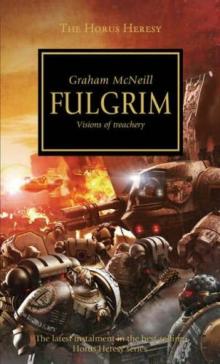 Fulgrim: Visions of Treachery whh-5
Fulgrim: Visions of Treachery whh-5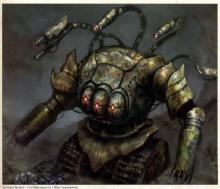 The Kaban Project (warhammer 40000: horus heresy)
The Kaban Project (warhammer 40000: horus heresy)![[Sigmar 02] - Empire Read online](http://i1.bookreadfree.com/i1/04/05/[sigmar_02]_-_empire_preview.jpg) [Sigmar 02] - Empire
[Sigmar 02] - Empire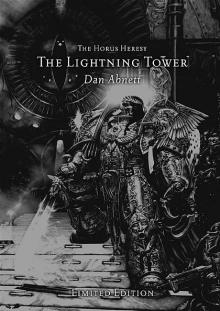 The Lightning Tower & The Dark King
The Lightning Tower & The Dark King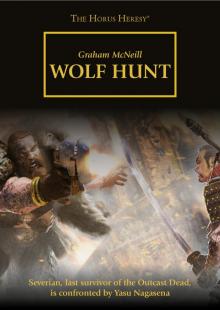 Wolf Hunt
Wolf Hunt Killing Ground w4u-4
Killing Ground w4u-4![Warhammer - [The Ambassador Chronicles 02] - Ursun's Teeth Read online](http://i1.bookreadfree.com/i1/04/05/warhammer_-_[the_ambassador_chronicles_02]_-_ursuns_teeth_preview.jpg) Warhammer - [The Ambassador Chronicles 02] - Ursun's Teeth
Warhammer - [The Ambassador Chronicles 02] - Ursun's Teeth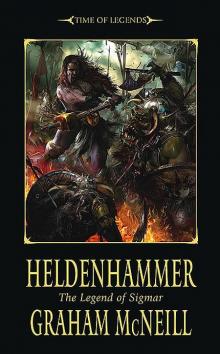 01 - Heldenhammer
01 - Heldenhammer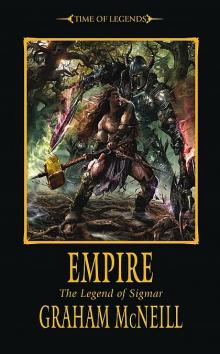 02 - Empire
02 - Empire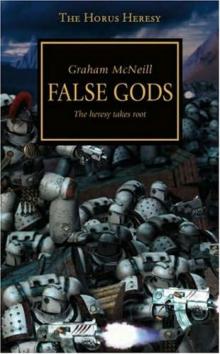 False Gods whh-2
False Gods whh-2